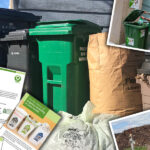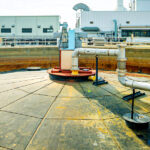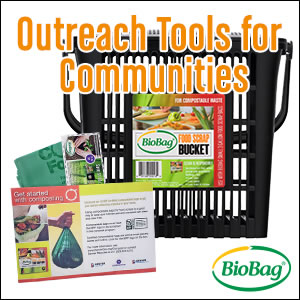Top: Kate Porterfield, a graduate student at the University of Vermont, measures the quantity and types of microplastics in depackaged food waste. Photos courtesy of the University of Vermont
A University of Vermont (UVM) press release about a new research project notes that more than one-third of the food waste generated in Vermont is still packaged, “a sticky situation” when it comes to mandatory diversion of food waste away from landfills under the state’s Universal Recycling Law (Act 148). Act 148’s ban on all food scraps disposal in landfills became effective in July 2020. Researchers at UVM have partnered with Casella Waste Systems to test the efficiency of Casella’s new depackaging system at the company’s recycling facility in Williston (VT). Two graduate students, working with Assistant Professor Eric Roy, received funding from Casella to quantify the value of the depackaged food waste for biogas production and composting and assess its plastic contamination.
Kate Porterfield, a graduate fellow, is measuring biogas production and testing methods that quickly and easily isolate and quantify the presence of microplastics. Porterfield uses an instrument called an Automated Methane Potential Test System (AMPTS 2), a lab-bench-scale anaerobic digester that runs 15 soft-drink-sized bottles of food waste samples at once. Each time a sample creates methane, a computer records gas bubbles and creates a graph of biogas production. This helps the researchers determine how efficiently food waste can be turned into biogas. After the organic waste is digested, tiny pieces of plastic can be easily removed using a fine mesh sieve. Porterfield counts the particles under a microscope to see how much plastic is contaminating the organic matter. She then uses Fourier Transform Infrared (FTIR) spectroscopy to classify the polymers of plastic isolated from the lab digestion process.
“Our findings are hugely important to Vermont’s Universal Recycling Law which necessitated this kind of research,” explains Porterfield. “There is so much we don’t know about using food waste, particularly the impacts of plastic contamination.” UVM Master’s student Sarah Hobson will study depackaged food waste, composting, and plastics contamination. “Can compost that contains microplastics be used safely in the environment?” she asks. “This is still a new field of study, and we are trying to get a better understanding of the life cycle of plastic in food waste.”













